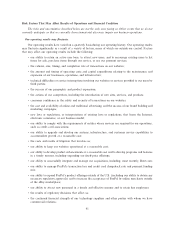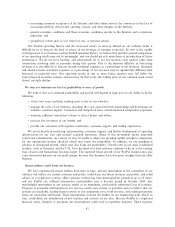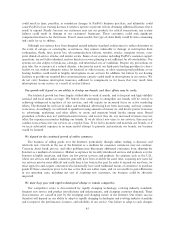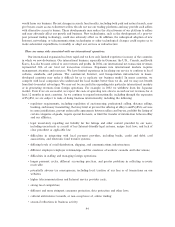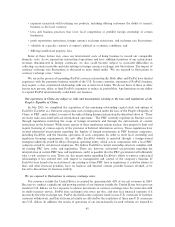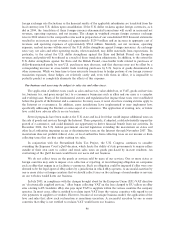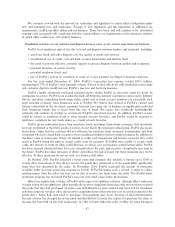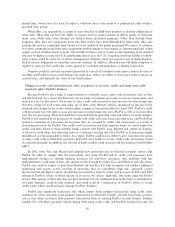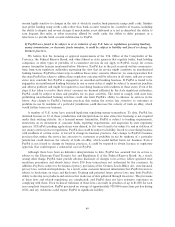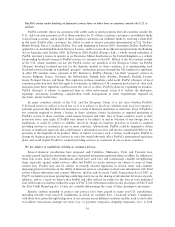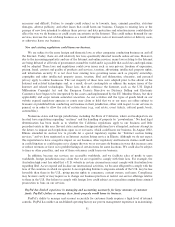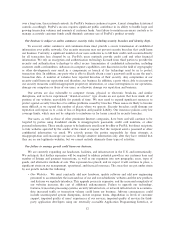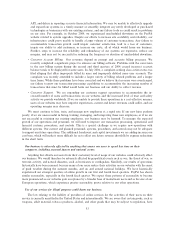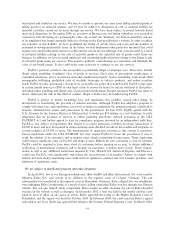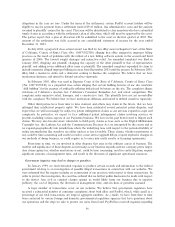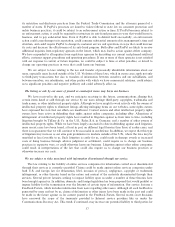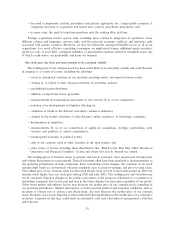eBay 2004 Annual Report Download - page 52
Download and view the complete annual report
Please find page 52 of the 2004 eBay annual report below. You can navigate through the pages in the report by either clicking on the pages listed below, or by using the keyword search tool below to find specific information within the annual report.PayPal's status under banking or Ñnancial services laws or other laws in countries outside the U.S. is
unclear.
PayPal currently allows its customers with credit cards to send payments from 44 countries outside the
U.S., and to receive payments in 43 of those countries. In 23 of these countries, customers can withdraw funds
to local bank accounts, and in eight of these countries customers can withdraw funds by receiving a bank draft
in the mail. PayPal oÅers customers the ability to send or receive payments denominated in U.S. Dollars,
British Pounds, Euros, Canadian Dollars, Yen, and, beginning in January 2005, Australian Dollars. PayPal has
applied for an Australian Financial Services License, and has received an oÇcial exemption from the Banking
Act in Australia until October 2005. In February 2004, PayPal (Europe) Ltd., a wholly-owned subsidiary of
PayPal, received a license to operate as an Electronic Money Institution in the United Kingdom as a vehicle
for providing localized versions of PayPal's service to customers in the EU. Fifteen of the 44 countries outside
of the U.S. whose residents can use the PayPal service are members of the European Union. As PayPal
(Europe) develops localized services for the domestic market in these countries, it is implementing such
localized services through an expedited ""passport'' notiÑcation process through the UK regulator to regulators
in other EU member states, pursuant to EU Directives. PayPal (Europe) has Ñled ""passport'' notices in
Austria, Belgium, France, Germany, the Netherlands, Ireland, Italy, Sweden, Denmark, Finland, Luxem-
bourg, Portugal, Greece and Spain. The regulators in these countries could notify PayPal (Europe) of local
consumer protection laws that will apply to its business, in addition to UK consumer protection law. Any such
responses from these regulators could increase the cost of, or delay, PayPal's plans for expanding its business.
PayPal (Europe) is subject to signiÑcant Ñnes or other enforcement action if it violates the disclosure,
reporting, anti-money laundering, capitalization, funds management or other requirements imposed on
electronic money institutions.
In many countries outside of the U.S. and the European Union, it is not clear whether PayPal's
U.S.-based service is subject to local law or, if it is subject to local law, whether such local law requires a
payment processor like PayPal to be licensed as a bank or Ñnancial institution or otherwise. Even if PayPal is
not currently required to obtain a license in those countries, future localization or targeted marketing of
PayPal's service in those countries could require licensure and other laws of those countries (such as data
protection laws) may apply. If PayPal were found to be subject to and in violation of any foreign laws or
regulations, it could be subject to liability, forced to change its business practices or forced to suspend
providing services to customers in one or more countries. Alternatively, PayPal could be required to obtain
licenses or regulatory approvals that could impose a substantial cost on it and involve considerable delay to the
provision or development of its product. Delay or failure to receive such a license would require PayPal to
change its business practices or features in ways that would adversely aÅect PayPal's international expansion
plans and could require PayPal to suspend providing services to customers in one or more countries.
We are subject to regulations relating to consumer privacy.
Several domestic jurisdictions have proposed, and California, Minnesota, Utah, and Vermont have
recently passed, legislation that limits the uses of personal information gathered online or oÉine. In addition to
these four states, many other jurisdictions already have such laws and continuously consider strengthening
them, especially against online services. eBay and PayPal in certain instances are subject to some of these
current laws. PayPal may also be subject to recently enacted legislation in several states and countries
imposing greater restrictions on the ability of Ñnancial services companies to share user information with third
parties without aÇrmative user consent. However, the Fair and Accurate Credit Transactions Act of 2003, or
FACT, included a provision preempting conÖicting state laws on the sharing of information between corporate
aÇliates, and as a result we believe that PayPal and eBay will not be subject to the laws of each individual
state with respect to matters within the scope of FACT, but will remain subject to the provisions of FACT and
the Fair Credit Reporting Act. Courts are currently determining the scope of these preemptive provisions.
SpeciÑc statutes intended to protect user privacy have been passed in many non-U.S. jurisdictions,
including virtually every non-U.S. jurisdiction in which we currently have a localized website. Compliance
with these laws, given the tight integration of our systems across diÅerent countries and the need to move data
to facilitate transactions amongst our users (e.g., to payment companies, shipping companies, etc.), is both
50



